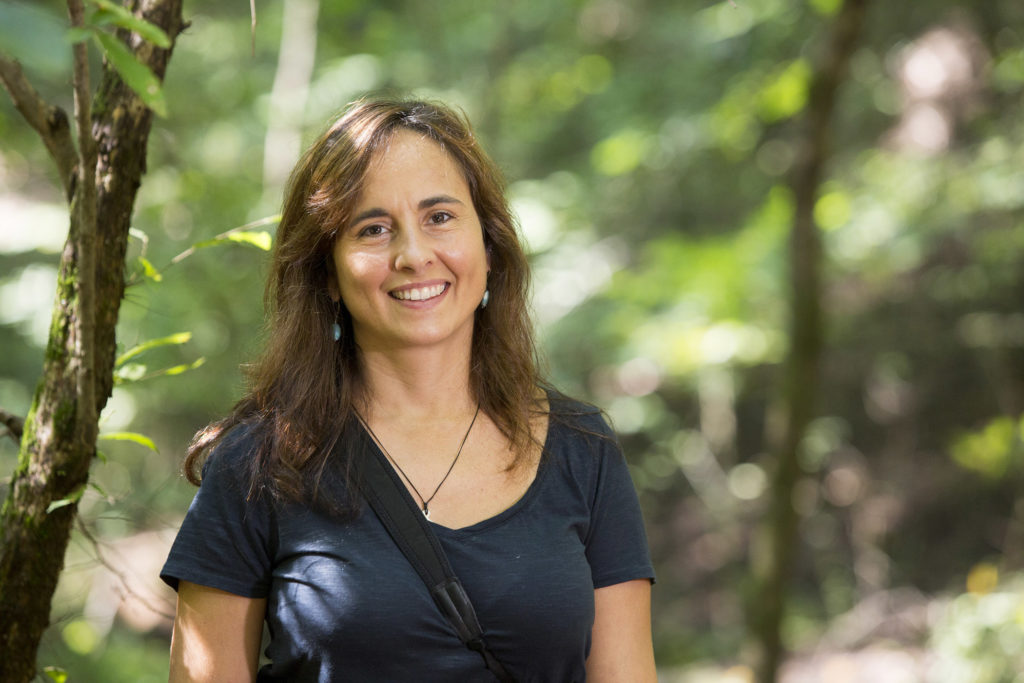FACTS
Sonia Hernandez
Associate Professor
- Warnell School of Forestry and Natural Resources and College of Veterinary Medicine
- Ph.D., Ecology, UGA, 2008
- D.V.M., Veterinary Medicine, Louisiana State University, 1996
- B.S., Biology, University of New Orleans, 1992
- At UGA: Seven years
Dr. Sonia Hernandez traces her love of nature and wildlife back to her childhood in Spain, where as a young adventurer she would explore the outdoors and bring home critters.
“I was the kid who had frogs and turtles in the tub. I had snails around my house getting out and climbing in the ceiling. I stuffed the house with animals,” said Hernandez, an associate professor in the Warnell School of Forestry and Natural Resources and the College of Veterinary Medicine.
She describes scenes of herself as a young girl well-tanned from the sun, wearing nothing but bathing suit bottoms and riding around on a donkey at her grandmother’s house in Caceres.
“My mom called me Mowgli (from The Jungle Book) because I had really short dark hair,” she said.
The adult Hernandez has a more sophisticated approach to interacting with wildlife—she holds a Doctor of Veterinary Medicine and a doctorate in ecology—and her dark brown hair has gotten longer, but her enthusiasm for the natural world is just as strong as when she was a little girl. Now Hernandez combines a medical background with fieldwork and ecological principles to examine diseases in wildlife populations in the U.S. and beyond—all while also training a new generation of scientists to work in the field.
Most of Hernandez’s work looks at how human activity affects the spread of diseases in wildlife and harms biodiversity.
“We recognize that every living creature—whether it’s well-defined or not—plays an important function in its ecosystem,” she said. “(Humans) are tinkering with those functions at unprecedented rates.”
Herndandez’s two doctoral degrees underscore her long journey to turn her passions into a career; they also give her a unique skill set for research and teaching.
“I was split between two worlds,” she said. “Between the clinician who took care of individual animals—whether it was a pet rabbit, the lion at the zoo or an owl hit by the car—and looking at the bigger picture of how diseases affect wildlife populations.”
Most of her work at UGA has focused on the latter. Hernandez has studied salmonella in wild animals, the health of white ibis populations in South Florida and the behavior of domestic and feral cats outfitted with “KittyCam” video cams.
Like the young girl riding outdoors on her grandmother’s donkey, Hernandez said she feels most at home working in the field. However, she isn’t doing the work alone.
Undergraduate, master’s and doctoral students have gained fieldwork experience in these projects and others through the Hernandez Wildlife Disease Lab, which she leads in the Warnell School.
Henry Adams, who graduated from the Odum School of Ecology in May, got to work in Hernandez’s lab as an undergraduate student and now as a research technician on staff. As a student, Adams thought he wanted to work with animals and promote conservation efforts. Working with Hernandez was an opportunity to give it a shot.
“The field and lab work helped me confirm what I wanted to do,” Adams said.
In addition to her lab, Hernandez teaches a summer course in Costa Rica that focuses on field techniques in conservation biology and medicine.
“We spend most of our time doing things, touching things, exploring things, catching, poking and prodding,” she said.
For Hernandez, teaching is one of the best ways to leave a legacy. Realistically, Hernandez said, she never will win a Nobel Prize so her biggest contribution is in training students.
“What we can do is make a significant difference in the next generation of scientists,” she said. “I’m here to make sure they are better than me.”
